A) RIPE FRUIT PROCESSING
INTO POWDERS (SEEDS NOT INCLUDED)
|
Following is a brief
description of a patented process used in locally in Hawaii
to manufacture a powdered noni fruit product for encapsulation
as a nutraceutical product.
The full text of the patent description is available at the
USA patent search home page at: http://www.uspto.gov/
[select “patent search” and type in “Morinda
citrifolia”, or search for the specific patent number:
Patent # 5,288,491 (Moniz)].
The nutritional information for this powdered noni fruit product
may be found at:
http://www.nonimaui.com/noni_news/comparison.html
|
- Ripe fruits are washed and dried.
- Fruit pulp is separated from seeds, seeds are discarded.
- Fruit pulp is placed into food dehydrators.
- Dehydrated pulp is formed into brittle wafers by dehydration
process.
- Noni fruit wafers are ground into a powder and encapsulated.
|
|
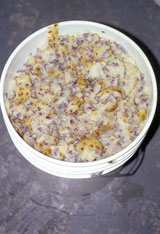
Noni seeds and pulp before they are pureed and separated. |
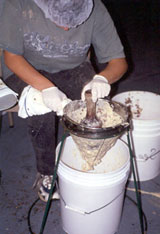
After the noni fruit flesh is transformed into a puree using
a food processor, the puree (pulp and fluids) is separated manually
from the seeds. |
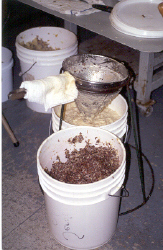
Foreground: noni seeds, separated from flesh, to be discarded
and (background) noni puree ready for dehydration. |
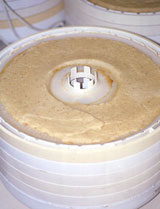 |
 |
 |
| The noni fruit puree
is spread onto fruit dehydration rings using a rubber spatula.
The dehydration rings are stacked. A thin layer of crusty noni
puree is produced, the noni “wafers”. |
|
 |
 |
| Dehydrated noni fruit
puree (wafers) has an amber color, and is thin and flaky. This
material is then ground into a powder and encapsulated. |
|

The final product, encapsulated and dehydrated noni fruit powder. |
|
B) GREEN FRUIT
PROCESSED INTO POWDERS (SEEDS ARE ALSO INCLUDED) |
| Some processors of noni
fruit prefer to make powders from the green fruit. The green
fruits are more amenable to mechanical chopping and drying than
are ripe fruits, as they do not bleed a lot of juice all over
the equipment. For processors of green fruit, the noni seeds
are also ground into the powder. Here is a summary of the process: |
- Green fruits are washed
- Fruits are chopped
- Chopped fruits are dried in forced-air heaters
- Dried fruit fragments are powdered.
- The powdered material is reconstituted by the buyer into
noni beverages.
|
|
 |
|

Noni fruit powder (left) and juice (right). |
|
C) SOME MISCELLANEOUS
NONI PRODUCTS |
Miscellaneous products
made from Morinda citrifolia include:
Teas
Pills made from leaves (and sometimes amended with other herbs
such as garlic)
Juice powders
Dried fruit sections
Hand and body lotions
Soaps
Noni leaf products are produced by some manufacturers. Below
are pills made in Korea from leaves of Morinda citrifolia.
|
|

Noni pills, made from leaves of Morinda citrifolia, manufactured
and marketed in Korea. |
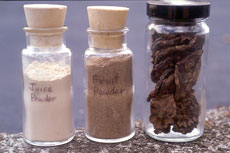
LEFT: Noni juice powder (dehydrated noni juice plus a carrier)
CENTER: Noni fruit powder produced from green fruit (seeds included).
RIGHT: Dried noni fruit slices. |
| Back to Top |

